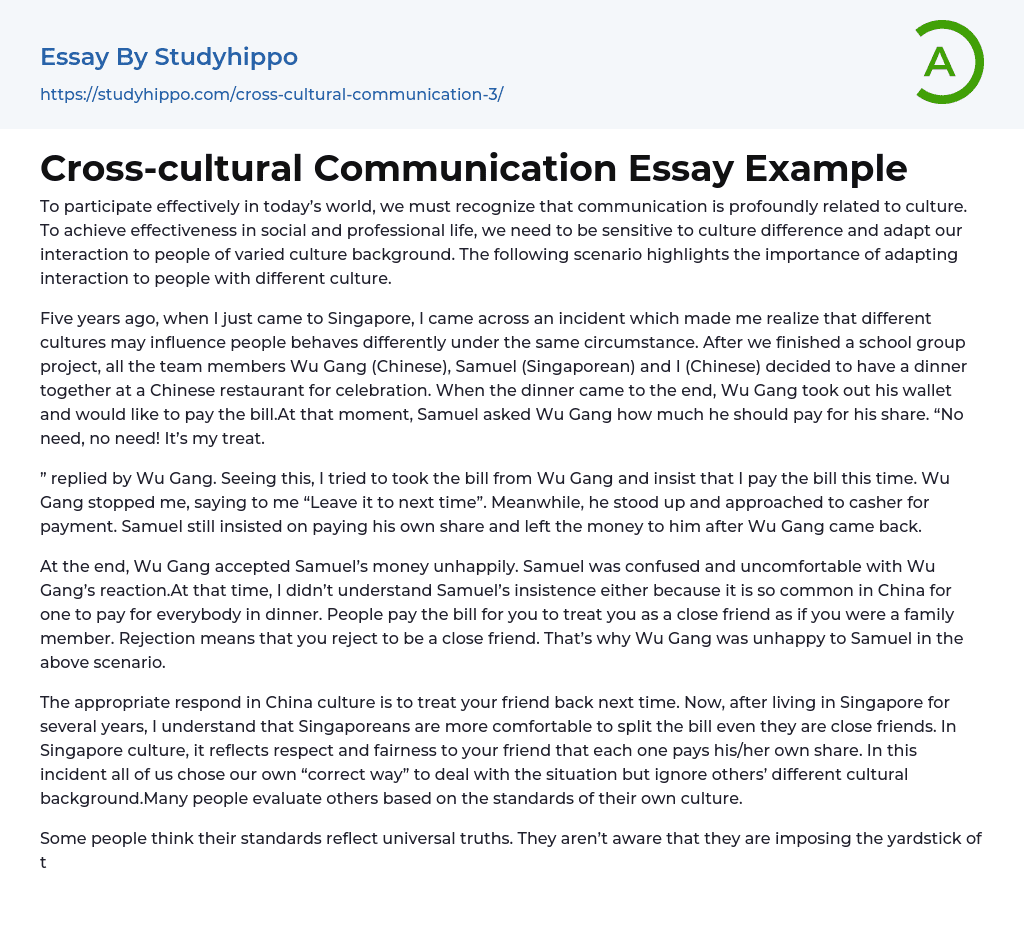To effectively engage in contemporary society, it is crucial to acknowledge the connection between communication and culture. In order to succeed both personally and in a business setting, it is imperative to remain mindful of cultural discrepancies and adjust our approach when engaging with individuals from diverse cultural backgrounds. The significance of adapting our interaction in such scenarios is emphasized in the following example.
Upon arriving in Singapore five years ago, I had an experience that illustrated how one's culture can affect their behavior in a given situation. As members of a school group project, Wu Gang (a Chinese individual), Samuel (a Singaporean), and myself (also Chinese) celebrated the project's completion with dinner at a local Chinese restaurant. As the meal came to an end, Wu Gang attempted to pay the bill, bu
...t Samuel insisted on paying his share. Wu Gang declined, saying "No need, no need! It's my treat."
"Leave it to next time," Wu Gang replied when I attempted to take the bill from him and pay for it. Despite my insistence, he stopped me and proceeded to make the payment himself while I watched. Samuel remained adamant about paying his own share and left the money with Wu Gang after he returned from the cashier,"
Despite Wu Gang's reluctance, he ultimately accepted the money offered by Samuel, leaving Samuel feeling confused and uncomfortable. At the time, I too struggled to understand Samuel's insistence, as in China it is customary for one person to pay for the entire dinner as a sign of closeness and friendship, akin to being family. Refusal of this gesture implies a rejection of the relationship. Thus, Wu Gang's unhappiness with Samuel'
insistence can be explained.
Different cultures have different approaches to paying bills. In China, it is customary to reciprocate the favor next time, while in Singapore, it is common for friends to split the bill as a sign of respect and fairness. However, in this incident, everyone followed their respective cultural norms, disregarding others' backgrounds. It is important to acknowledge and appreciate cultural differences instead of judging others based on our own standards.
Imposing one's cultural standards as universal truths and disregarding other cultures' yardsticks limit human interaction and breed misunderstandings. For instance, in China, one person typically covers the cost for a group meal of six, whereas in Western countries, the host usually pays when entertaining clients, but when friends dine together, they often split the bill.
The term for splitting the bill evenly is commonly known as 'going Dutch'.
- Greeting essays
- Orality essays
- Intercultural Communication essays
- Interpersonal Communication essays
- Cross-Cultural Communication essays
- Nonverbal Communication essays
- Effective Communication essays
- Communication Skills essays
- Bangladesh essays
- China essays
- Hong Kong essays
- India essays
- Japan essays
- Kuala Lumpur essays
- Malaysia essays
- Manila essays
- Pakistan essays
- Philippines essays
- Singapore essays
- Vietnam essays
- Vietnamese essays
- Arranged Marriage essays
- Communication essays
- Conflict Management essays
- Conflict Resolution essays
- Connection essays
- Conversation essays
- Dating essays
- Friendship essays
- Mediation essays
- Abnormal Psychology essays
- Abraham Maslow essays
- Attachment Theory essays
- Authority essays
- Behaviorism essays
- Classical Conditioning essays
- Cognitive Psychology essays
- Counseling essays
- Developmental Psychology essays
- Educational Psychology essays
- Erik Erikson essays
- Family Therapy essays
- Jean Piaget essays
- Maslow's Hierarchy Of Needs essays
- Mental Health essays
- Operant Conditioning essays
- Personality Psychology essays
- Positive Psychology essays
- Psychoanalysis essays
- Psychotherapy essays




